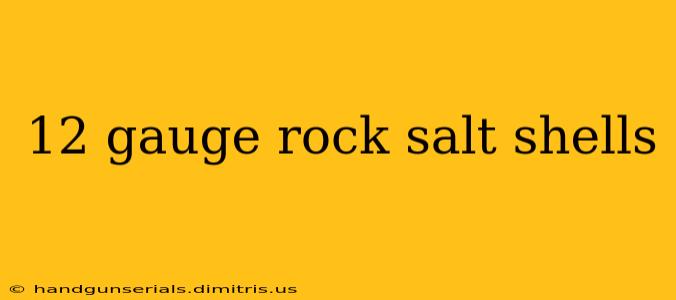Finding information on 12 gauge rock salt shells can be surprisingly tricky. This comprehensive guide will delve into their uses, effectiveness, legality, safety precautions, and potential alternatives. Whether you're a seasoned shooter or a curious newcomer, this guide aims to provide a clear and informative overview of this specialized ammunition.
What are 12 Gauge Rock Salt Shells?
12 gauge rock salt shells are shotgun shells loaded with rock salt instead of traditional shot like lead or steel. The rock salt pellets are typically larger and less uniform than traditional shot, resulting in a different pattern and impact. This makes them unsuitable for hunting game intended for consumption, but ideal for other applications.
Uses of 12 Gauge Rock Salt Shells
While not your typical hunting ammunition, rock salt shells have several specific applications:
Pest Control:
This is arguably the most common use. Rock salt shells are effective for deterring or dispatching nuisance animals such as birds, raccoons, and other small pests that may be causing damage to property. The relatively short range and less lethal nature of rock salt make it a more humane option in certain situations compared to lethal alternatives.
Non-Lethal Self-Defense:
Some individuals utilize rock salt shells as a less-lethal self-defense option. However, it's crucial to understand the limitations and potential legal ramifications before considering this. The effectiveness of rock salt for self-defense is debatable and highly dependent on the distance and circumstances. Always check local laws and regulations regarding the use of less-lethal self-defense options.
Training and Practice:
The lower cost and less destructive nature of rock salt make it a potentially appealing option for certain types of training exercises, particularly those involving close-range target practice.
Effectiveness and Limitations
The effectiveness of rock salt shells depends on several factors:
- Range: Rock salt has a much shorter effective range compared to traditional shot. Accuracy diminishes significantly beyond 10-15 yards.
- Pattern: The inconsistent size and shape of rock salt pellets lead to an unpredictable and less dense shot pattern.
- Penetration: Rock salt penetrates less deeply than lead or steel shot, making it less lethal. This is both an advantage (for humane pest control) and a disadvantage (for self-defense).
- Target: The effectiveness also depends on the size and type of target. Larger animals might not be significantly deterred or incapacitated by rock salt.
Legality and Safety
It is paramount to understand the laws and regulations in your area concerning the use of rock salt shells. Some jurisdictions have restrictions or outright bans on their use, particularly for self-defense. Always check your local laws before purchasing or using rock salt shells.
Safety precautions when handling and using any firearm, including those loaded with rock salt, are critical:
- Always treat every firearm as if it were loaded.
- Never point a firearm at anything you do not intend to shoot.
- Keep your finger off the trigger until ready to fire.
- Be aware of your surroundings and your target.
- Use appropriate eye and hearing protection.
Alternatives to Rock Salt Shells
Depending on the intended application, there may be safer and more effective alternatives to rock salt shells. These alternatives might include:
- Rubber bullets: For self-defense situations, rubber bullets offer a greater stopping power while remaining less lethal than traditional ammunition.
- Bean bag rounds: Similar to rubber bullets, these are designed for less-lethal force applications.
- Birdshot: For pest control, birdshot offers better penetration and range than rock salt while still being less lethal than buckshot.
Always consult with relevant authorities and experts to determine the most appropriate and legal solution for your specific needs.
Conclusion
12 gauge rock salt shells offer a niche application, primarily for pest control and limited training scenarios. However, it's crucial to understand their limitations, legal implications, and safety considerations before use. Always prioritize responsible gun ownership and adherence to local laws and regulations. This information is for educational purposes only and should not be considered legal or professional advice. Consult local authorities and experts for specific guidance.

